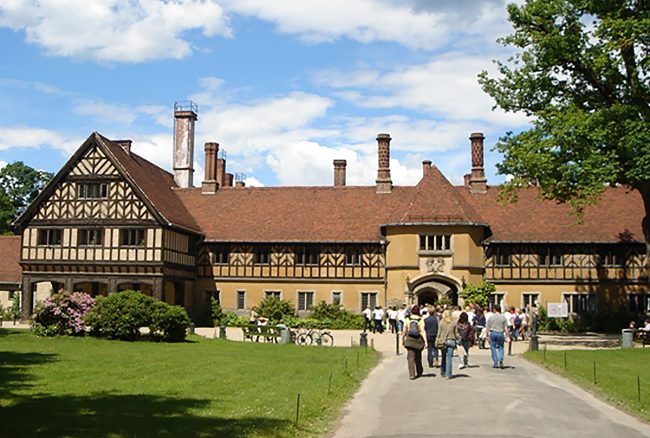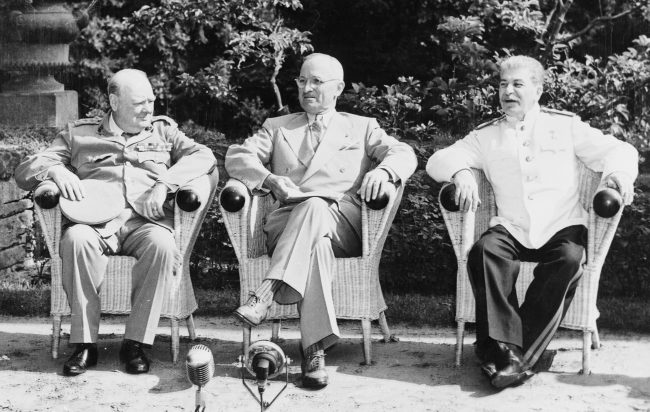
Cecilienhof Country House, Potsdam. This image is in the public domain.

Winston Churchill, Harry Truman, and Josef Stalin at the Potsdam Conference, Jul 25, 1945. This image from the U.S. National Archives and Records Administration is in the public domain.
Earlier Houses: There was an earlier house of 1865 designed by George E. Grayson called Hill Bark that was demolished when the 1891 house was built.
House & Family History: Erected in 1891 as Bidston Court, the black-and-white timbered Tudor style house today called Hillbark was built for the millionaire soap manufacturer Robert William Hudson on Bidston Hill in Birkenhead at a cost of £150,000. In 1921 Bidston Court was sold to Sir Ernest Royden, who, between 1928 and 1931, dismantled, moved, and re-erected the house five miles away on its current site at Frankby. After the move, Sir Ernest renamed the Cheshire vernacular style house (a subset of the English Tudor style) Hill Bark after the earlier 1865 house. Bidston Court was originally decorated and furnished in the Arts & Crafts style and features stained glass panels of poets made by Morris & Co. and elements from other houses, including a carved Jacobean chimneypiece and paneling that was supposedly removed from Sherborne Castle, Sir Walter Raleigh’s Dorset country house. In the 1960s the house was an old people's home; since the early 21st century Hillbark has been operated as a luxury hotel. Cecilienhof Palace (Cecilienhof Country House, Schloss Cecilienhof; see "Images" section) is a 176-room house in Potsdam, Germany, that was built between 1914 and 1917 to the designs of Paul Schultze-Naumburg as a residence for Crown Prince Wilhelm, eldest son of German Emperor Wilhelm II. Designed in a blend of English Tudor and Bavarian Alpine styles, the house was named after Duchess Cecilie of Mecklenburg-Schwerin, wife of the crown prince. English Tudor was supposedly a favorite style of the crown prince, who may have seen Bidston Court during a trip to England and been so impressed with the house that he requested Cecilienhof be designed in a similar style. Fascinating as this historical tidbit may be, there is debate about its veracity. The crown prince and princess lived at Cecilienhof until 1945, when the house was seized by the Soviet Army at the end of World War II. After the end of the war the Potsdam Conference (officially the Berlin Conference), considered one of the most important conferences of the 20th century, took place at Cecilienhof. The third, last, and longest summit of the “Big Three” victorious Allied powers (the United Kingdom, the United States, and the Soviet Union), the conference, which lasted from July 17 until August 2, 1945, produced the Potsdam Agreement, which laid the groundwork for the postwar order. Today a United Nations World Heritage Site, Cecilienhof continues to host important events: Queen Elizabeth II visited on November 3, 2004, and on May 30, 2007, the palace was the venue for a summit of the G8 foreign ministers.
Comments: Edward Horton Hubbard (1937-89), the English architectural historian who worked with Nikolaus Pevsner compiling "The Buildings of England" series of books commenting on Hillbark: “one of the most notable Victorian essays in half-timbered design in the country.”
Garden & Outbuildings: The former parkland of Bidston Court was renamed Royden Park and is today a public park. The Bidston Court lodge, notable for its tall, twisted chimneys, is the only extant building from the original estate.
Architect: Rees & Holt
Date: 1928-31Architect: Grayson & Ould
Date: 1928-31
Title: Cheshire Country Houses
Author: de Figueiredo, Peter; Treuherz, Julian
Year Published: 1988
Reference: pgs. 115, 116, 118
Publisher: Sussex: Phillimore & Co. Ltd.
ISBN: 0850336554
Book Type: Hardback
Title: Guide to the Country Houses of the North-West, A
Author: Robinson, John Martin
Year Published: 1991
Reference: pg. 11
Publisher: London: Constable and Company Limited
ISBN: 0094699208
Book Type: Hardback
House Listed: Grade II*
Park Listed: Not Listed
Past Seat / Home of: SEATED AT CURRENT HOUSE: Robert William Hudson, late 19th century. Sir Ernest Bland Royden, 3rd Bt., 1921-?60.
Current Ownership Type: Corporation
Primary Current Ownership Use: Hotel
Ownership Details: Today Hillbark Hotel
House Open to Public: By Appointment
Phone: 01516-252-400
Fax: 01516-254-040
Email: [email protected]
Website: https://hillbarkhotel.co.uk/
Historic Houses Member: No